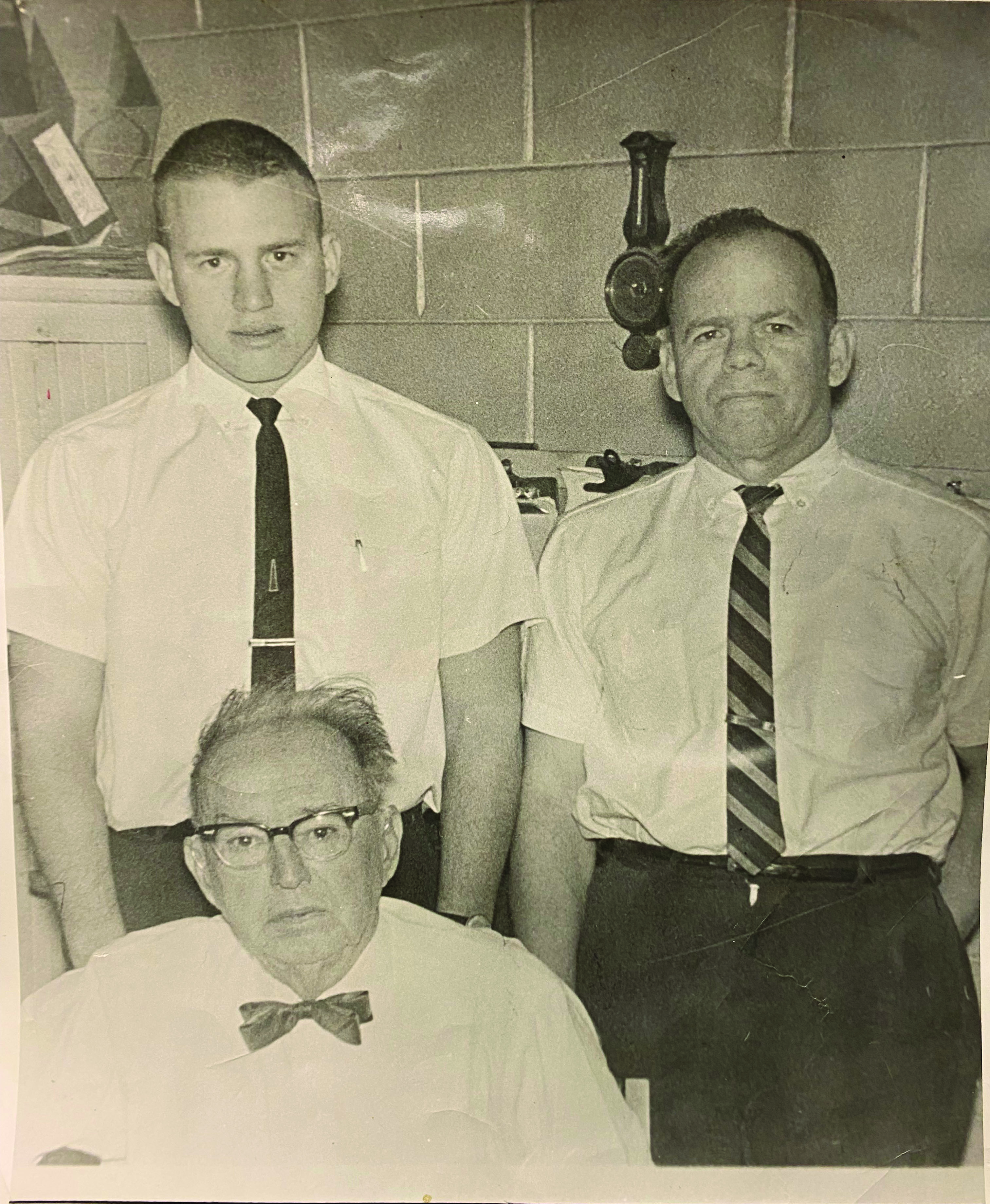Stam Law Firm
On paper, this long-standing family law firm might seem like a less than perfect partnership. Carl Holleman, a Wake Forest Law School graduate, was a very active democrat. Paul (Skip) Stam, a graduate of UNC-Chapel Hill Law School, was an active republican. These two members of the Apex business community, related through a mutual connection to Stam’s wife, joined forces in 1976 at the law practice Holleman started 24 years earlier, in 1952. Stam noted that coming at problems from both sides of the political (i.e., ideological) aisle provided fresh perspective and insight and likely made them both better lawyers. Today, at almost 70 years, the Stam Law Firm is one of the oldest family businesses in Apex.
Carl Holleman grew up in Holleman’s Crossroads, which now sits underneath Harris Lake. As a child, Carl would hop on the train from New Hill to Apex. Carl was the historian of Western Wake County. He wrote many articles about the history of Apex. He passed that baton to his sons who authored Blood, Perseverance and Paint, which is arguably one of the finest historical accounts of Apex. Paul Stam, in a nod to his now deceased law partner, still gives this book out to new clients.
Holleman’s first law office was down the alley off of W. Chatham Street that sits behind Salem Street. He eventually moved to what is today, the parking lot at Apex Baptist Church. He remained there from 1960 to 1992, the year that he died. It was during this period, in 1976, that Paul Stam joined the practice. In 2015, due to church expansion, Stam moved the practice to its current location at 510 W. Williams Street which is directly across the street from the post office.
As a child and young adult, Stam lived all over the country but settled in Apex in 1977 due in large part to Stam’s wife who had deep family roots in the area. Stam had already joined Carl Holleman’s law firm as Holleman was looking for an associate and Stam was looking for a job. A mutual relative put the two in touch.
I asked Stam why he pursued a law degree. It wasn’t because of his father. Stam’s dad became a lawyer after him. It was his grandfather. A man who was a lawyer even though he never attended law school.
“I really admire my grandfather,” Stam said.
Stam noted that his grandfather immersed himself in Blackstone’s Commentaries on the Laws of England. Stam’s grandfather worked in the court system and even won the award for fastest stenographer. Stam also shared that his grandfather recommended he read Mr. Tuts Casebook. These were compendiums of fictional legal cases (articles reprinted from the Saturday Evening Post) that had their foundation in the law. Despite these being fiction, you could learn a thing or two. The seed was planted.
Stam entered the military at 17 but soon realized this was not his key to success and he started taking correspondence courses on the base. (ECU had an extension there.) Stam’s passion for the law made him decide to attend law school ahead of going to undergraduate school. In addition to the correspondence classes, he took courses during two summers at UNC-Greensboro. He then attended Michigan State since they were able to take all of his accrued credits. He completed his military training and undergraduate course load in four years.
What else about being a lawyer appealed to Stam?
“I’m good at taking a situation, finding all of the facts and finding a solution. It’s about finding a fair solution and effectuating it,” Stam noted.
Stam married his wife, Dottie, with two years left of law school. They wanted to move to a small, semi-rural town. He had offers to move to big cities but they collectively weren’t interested. They settled in Apex where, as previously mentioned, Dottie had a lot of family so their support network was deep and strong. At this time, there were 3,000 people living in Apex. For a law firm that practiced a great deal in real estate, Apex wasn’t a bad place to call home and home it’s been ever since. Most of Stam’s grandchildren live in Apex—nine altogether. Stam plans to retire in a few years and while there is no family waiting in the wings to carry on the family business, the firm will carry on regardless.
Stam noted that challenges have been few and far between. Current economic conditions during the pandemic did not affect the firm as they worked hard every day. During the real estate crunch in 2008, the firm had to navigate its most difficult stretch.
I asked Stam if he had any witty stories he could share (within the confines of the confidentiality requirements). Stam shared a time when both he and Carl were trying a case together—something that didn’t happen very often. In the middle of trial, Carl promised to pick up and bring to court a critical witness. Carl picked him up in his old Mercedes, one of the reasons for their witness’ willingness to attend. When Carl arrived at the courthouse, the witness asked,
“What do I have to say?”
Carl told him to tell the truth.
Their witness then asked, “Can you remind me what the truth is.”
Stam shared another story about an old guy—a laborer—who hurt his hand in an accident. This guy was being deposed by one of the top trial lawyers in America, during the early days of that lawyer’s career.
Lawyer to Plaintiff: “Are you Mr. Yates?”
Mr. Yates to Lawyer: “What’s left of me.”
This family business, with deep roots in the community, withstood tests of time, competing political ideologies, three office changes, a housing crunch, and a pandemic. And, even with Paul Stam likely to step down in the near future, the future looks bright. Case closed.
LG Jordan Oil
LG Jordan Oil sits in the middle of downtown Apex. That’s by coincidence, not design. At almost 100 years old, LG Jordan Oil settled on this spot years ago not knowing the kind of growth that would go on around them. Ironically, LG Jordan Oil, the company and the family, has been at the center of Apex for many, many years.
I sat down with Larry Jordan, third generation owner and CEO of the company. He told me that his grandaddy was LG Jordan.
Larry shared that his grandaddy lived in Wilmington and was headed to Sanford to open a tire dealership. Fate had him stop in Apex and he never left. Larry puts the business start date sometime in 1924. It started as a little oil dealership and was essentially a home delivery oil business and it stayed that way for a long time.
Larry’s father joined the business, and then in 1967, Larry joined. Larry noted that his father died in 1970 and his grandfather in 1976, so Larry followed his grandfather into the business as head of LG Jordan Oil.
In the early days, LG Jordan was all about providing heating oil to tobacco farmers who used it in their curing barns. In 1971, they shifted to propane. At the time, the tobacco farmers had made this shift. Larry said it was an important move that has served them well.
Today, they sell some diesel fuel and still have some oil clients. As you might have guessed, the business they’d had from tobacco farmers no longer exists. Their core customers are business accounts.
LG Jordan used to own two convenience stores in Apex. One was on Highway 55 at US-1 where McDonalds sits today. The other, a Shell gas station and convenience store, remains at the corner of Olive Chapel Road and Highway 55.
Larry shared that while he is the CEO, his daughter, Amy, is the president and the more hands-on leader of the business. She joined the business in the early 1990s and is fourth generation. Amy’s son and Larry’s grandson, Carl, will eventually take over LG Jordan Oil and will be the fifth generation.
Since LG’s fateful trip back in 1924, the Jordan family has lived in Apex their entire lives. But why stay in Apex for so long? From Larry’s perspective, there are a lot of reasons.
“Business has been good. We’ve seen a lot of growth. I used to walk down the street and knew everyone. Not anymore,” Larry said.
Larry has been involved in many local, county and state-level organizations and governmental posts, including stints on the Board of Commissioners and at the National Petroleum Association; he has been a member of the Lions Club for 57 years; an active member at the United Methodist Church just off of Salem Street where he has held virtually every office; he was mayor of Apex from 1981 to 1989; and was elected to the State House where he held that office for two years. Amy has followed in his footsteps holding many offices across industry and community organizations. Amy, Larry and his dad were presidents of the Apex Chamber of Commerce. They all put time and money into the community.
Larry noted that some of his involvement took him away from the business, to its detriment. When he was mayor, he voluntarily gave up working at the business since the town was an LG Jordan Oil customer. He saw this as the right thing to do to avoid any conflict of interest. In the end, the Jordan family was, and is, compelled to be active in their industry, their church and in the broader community. Larry noted that when the community is good to you, you feel an obligation to give back.
Giving back comes in all shapes and sizes.
Larry noted that “as a company, we can’t be everything to everyone, but we’ve always tried to help others who need it.” Larry shared something he has impressed upon his children.
“Because of your birth, you’ve never wanted for shelter or food,” he said.
Then he shared a story about a lady who called and needed to order gas to heat her home. She asked how much 100 gallons of gas would cost. When told, she cried and said she needed to make a decision between heat and feeding her family. Larry contacted his extensive community network and was able to deliver 100 gallons to her. A local community organization paid for it.
When asked about challenges, Larry noted that since the majority of their products come from the Gulf, any hurricane activity would undermine supply, short-term, but they’d be able to bounce back pretty quickly. However, he was quick to point out that their most difficult time as a business came during the oil embargo of 1973. Larry was at the helm then and said it was easily the biggest challenge they had ever faced.
“We made more friends during that year than ever before,” he joked.
Of course, when there is an oil/fuel shortage, the local oil/fuel company is in high demand.
“We were short staffed back then and the lines at our stations were around the block. We’d sell out by 9 a.m.” Larry said. The embargo went on for about a year. It was a tough, tough time.
But that was almost fifty years ago. As I sat with Larry, he noted that his grandson Carl and the future of LG Jordan Oil was out on a truck today pumping fuel.
“You learn the business from the bottom up,” Larry said. “It has been a good ride.”
Apex Nursery
Apex Nursery, which sits prominently on NC-751 in Apex, just at the Chatham County line, was established in 1918. At over 100 years, they are one of the longest-lived, family-owned businesses in Apex.
The Copeland family has run this wholesale nursery from the beginning with a fifth generation (Will’s daughter) waiting in the wings. I spoke to Will Copeland, who is fourth generation, and he shared that the first generation was D.S. Copeland; second generation was Palmer Copeland, who also owned the Wilsonville Store on Highway 64. Ronald W. Copeland, Will’s dad, was third generation.
So, why the nursery business?
Will shared that spanning back a few generations, farming was so important. With heavy demands put on landowners and his grandfather being a tobacco farmer and his father’s passion for the plant industry, the combination of demand and supply compelled the Copelands to open the nursery.
The first incarnation of Apex Nursery (in Apex) stood across the street from the current monolith Crossroads Ford in Apex. They moved to their 200-acre home off of NC-751 in 1961.
In their early days, they were partners with York Properties who had a prominent footprint in Wilmington. Apex Nursery would load up their trucks and travel to the coast to make deliveries and landscape new construction. This was, of course, before the booming growth in central NC.
However, in the early 1980s, they pulled back on the landscaping work and just grew plants.
To be sure, they are not a retail nursery although they will sell to passersby who stop, out of respect to them. They are more about plant propagation and are a wholesale seller mostly to tract home businesses (i.e., package deals of trees/shrubs/lawn materials for application to new construction).
Will noted how immersed his father has been as an industry leader, holding the office of president of the NC Nursery Association for many years. But, beyond the core business, it’s really been about Apex.
“We grew up in Apex and no one has left because we love the community and have established long strong ties,” Will said.
At over 100 years in business, Will seemed more interested in talking about the future, than their past.
“We are just getting started,” he shared.
Though the business is about plants, soil, and the earth, Apex Nursery did find it necessary to diversify a bit, branching out to areas like restaurants and even ship building. But, at the end of the day, they are a nursery. Will shared that in today’s environment, you might be a nursery by day and a wedding venue at night to remain viable. So, they keep an open mind.
Will noted that they have had to endure their share of challenges including issues with water—demand, availability, and quality. They now have 23 ponds on their 200 acres to ensure water is not an issue. They took a real hit during the housing crunch but were able to weather that storm.
Perhaps most significantly, Will shared a time in the recent past where they had to fight local government’s attempts to redefine their business (a fight which the family won) and then they pivoted toward mulch as an alternative revenue stream. With massive growth (i.e., construction) comes a lot of land clearing. Apex Nursery saw this as an opportunity to recycle the removed trees into mulch. Mulch is a good thing. Their pivot to mulch was the magic they needed to emerge from the housing crunch.
And, speaking of magic, I had the honor of speaking with third generation Ronald Copeland who shared with me his story about Blue Santa Claus. About 40 years ago, Ronald approached Dean Smith, head basketball coach at UNC-Chapel Hill, if you didn’t know, and asked if he would be open to Ronald donning a blue Santa Claus costume and attending the last home game before Christmas. At the game, Blue Santa Claus would make the rounds, hand out candy and bubble gum to the children in attendance and spread Christmas cheer. Dean Smith was all in on the idea. Ronald Copeland was UNC-Chapel Hill’s Blue Santa Claus for 38 consecutive years until the pandemic got in the way. He wasn’t sure he’d be putting on the beard this year but recalled those years fondly.
In closing, the Copeland family is testament to the idea that there is wisdom in putting down roots, staying the course and giving back when you can.
Will Copeland texted me that his daughter was just accepted into the UNC Kenan Flagler School of Business. With this in mind, it’s hard to argue with Will that Apex Nursery is just getting started.








